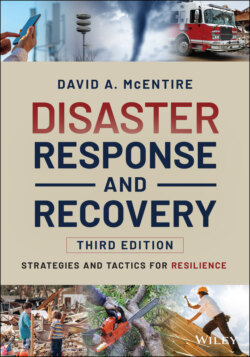Читать книгу Disaster Response and Recovery - David A. McEntire - Страница 95
2.2.3 Sheltering and Housing
ОглавлениеBusinesses also shelter individuals who evacuate from hazards such as hurricanes (see Chapter 5). For example, hotels provide shelter for those who leave the coast when hurricanes approach. These accommodations could host hundreds, thousands or even hundreds of thousands of people moving inland to higher and safer ground. But, sheltering and housing is used in smaller events also. After the March 2020 earthquake that affected the Salt Lake Valley in Utah, local governments and the American Red Cross contracted with hotels so disaster victims would have a place to stay. This approach helped to isolate individuals and families, and thereby minimize the spread of Covid‐19 in communal shelters. Hotels may also house emergency workers when they arrive from outside jurisdictions to assist the affected community. This is important since disasters require external help from first responders, mutual aid partners and hundreds of people who perform recovery functions. The private sector also provides accommodations for people who lose public housing or residences in disasters and require sheltering for the intermediate or long term. This is especially important when disasters create serious housing shortages and when recovery is expected to be protracted. Manufacturers may produce and supply tents or mobile homes for temporary or semi‐permanent accommodations. Extended stay motels and apartment complexes may also help fill the gap before tenants or owners may move back into their repaired homes or reconstructed facilities.
